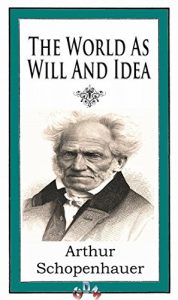Contents:
- The World As Will And Idea (Vol. 1 of 3)
- The World As Will And Idea (Vol. 2 of 3)
- The World as Will and Idea (Vol. 3 of 3)
The World As Will And Idea
--In the English language, this work is known under three different titles:
- The World as Will and Idea,
- The World as Will and Representation,
- The World as Will and Presentation.
The World as Will and Representation (German: Die Welt als Wille und Vorstellung) is the central work of the German philosopher Arthur Schopenhauer. The first edition was published in 1818/1819, and the second expanded edition in 1844. In 1948, an abridged version was edited by Thomas Mann.
Arthur Schopenhauer
- Arthur Schopenhauer (22 February 1788 – 21 September 1860) was a German philosopher. He is best known for his 1818 work The World as Will and Representation, in which he characterizes the phenomenal world as the product of a blind, insatiable, and malignant metaphysical will. Proceeding from the transcendental idealism of Immanuel Kant, Schopenhauer developed an atheistic metaphysical and ethical system that has been described as an exemplary manifestation of philosophical pessimism, rejecting the contemporaneous post-Kantian philosophies of German idealism. Schopenhauer was among the first thinkers in Western philosophy to share and affirm significant tenets of Eastern philosophy (e.g., asceticism, the world-as-appearance), having initially arrived at similar conclusions as the result of his own philosophical work. His writing on aesthetics, morality, and psychology would exert important influence on thinkers and artists throughout the 19th and 20th centuries.
Though his work failed to garner substantial attention during his life, Schopenhauer has had a posthumous impact across various disciplines, including philosophy, literature, and science. Those who have cited his influence include Friedrich Nietzsche, Richard Wagner, Leo Tolstoy, Ludwig Wittgenstein, Erwin Schrödinger, Sigmund Freud, Gustav Mahler, Joseph Campbell, Albert Einstein, Carl Jung, Thomas Mann, Jorge Luis Borges, and Samuel Beckett, among others.
- The World As Will And Idea (Vol. 1 of 3)
- The World As Will And Idea (Vol. 2 of 3)
- The World as Will and Idea (Vol. 3 of 3)
The World As Will And Idea
--In the English language, this work is known under three different titles:
- The World as Will and Idea,
- The World as Will and Representation,
- The World as Will and Presentation.
The World as Will and Representation (German: Die Welt als Wille und Vorstellung) is the central work of the German philosopher Arthur Schopenhauer. The first edition was published in 1818/1819, and the second expanded edition in 1844. In 1948, an abridged version was edited by Thomas Mann.
Arthur Schopenhauer
- Arthur Schopenhauer (22 February 1788 – 21 September 1860) was a German philosopher. He is best known for his 1818 work The World as Will and Representation, in which he characterizes the phenomenal world as the product of a blind, insatiable, and malignant metaphysical will. Proceeding from the transcendental idealism of Immanuel Kant, Schopenhauer developed an atheistic metaphysical and ethical system that has been described as an exemplary manifestation of philosophical pessimism, rejecting the contemporaneous post-Kantian philosophies of German idealism. Schopenhauer was among the first thinkers in Western philosophy to share and affirm significant tenets of Eastern philosophy (e.g., asceticism, the world-as-appearance), having initially arrived at similar conclusions as the result of his own philosophical work. His writing on aesthetics, morality, and psychology would exert important influence on thinkers and artists throughout the 19th and 20th centuries.
Though his work failed to garner substantial attention during his life, Schopenhauer has had a posthumous impact across various disciplines, including philosophy, literature, and science. Those who have cited his influence include Friedrich Nietzsche, Richard Wagner, Leo Tolstoy, Ludwig Wittgenstein, Erwin Schrödinger, Sigmund Freud, Gustav Mahler, Joseph Campbell, Albert Einstein, Carl Jung, Thomas Mann, Jorge Luis Borges, and Samuel Beckett, among others.






